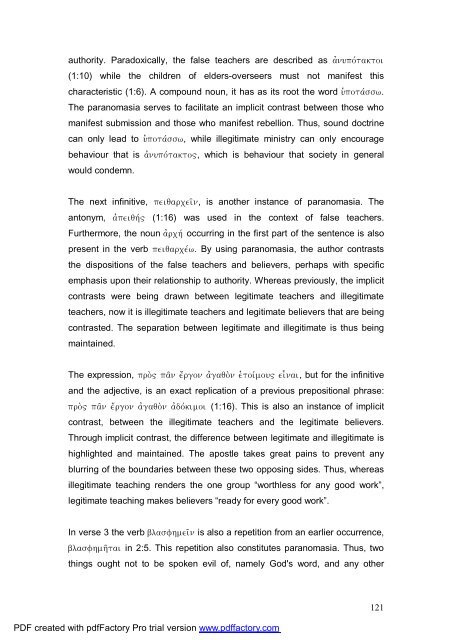A Text centred rhetorical analysis of Paul's Letter to Titus
A Text centred rhetorical analysis of Paul's Letter to Titus
A Text centred rhetorical analysis of Paul's Letter to Titus
Create successful ePaper yourself
Turn your PDF publications into a flip-book with our unique Google optimized e-Paper software.
authority. Paradoxically, the false teachers are described as ajnupovtak<strong>to</strong>i<br />
(1:10) while the children <strong>of</strong> elders-overseers must not manifest this<br />
characteristic (1:6). A compound noun, it has as its root the word uJpotavssw.<br />
The paranomasia serves <strong>to</strong> facilitate an implicit contrast between those who<br />
manifest submission and those who manifest rebellion. Thus, sound doctrine<br />
can only lead <strong>to</strong> uJpotavssw, while illegitimate ministry can only encourage<br />
behaviour that is ajnupovtak<strong>to</strong>~, which is behaviour that society in general<br />
would condemn.<br />
The next infinitive, peiqarcei`n, is another instance <strong>of</strong> paranomasia. The<br />
an<strong>to</strong>nym, ajpeiqhv" (1:16) was used in the context <strong>of</strong> false teachers.<br />
Furthermore, the noun ajrchv occurring in the first part <strong>of</strong> the sentence is also<br />
present in the verb peiqarcevw. By using paranomasia, the author contrasts<br />
the dispositions <strong>of</strong> the false teachers and believers, perhaps with specific<br />
emphasis upon their relationship <strong>to</strong> authority. Whereas previously, the implicit<br />
contrasts were being drawn between legitimate teachers and illegitimate<br />
teachers, now it is illegitimate teachers and legitimate believers that are being<br />
contrasted. The separation between legitimate and illegitimate is thus being<br />
maintained.<br />
The expression, pro;" pa`n e[rgon ajgaqo;n eJ<strong>to</strong>ivmou" ei\nai, but for the infinitive<br />
and the adjective, is an exact replication <strong>of</strong> a previous prepositional phrase:<br />
pro;" pa`n e[rgon ajgaqo;n ajdovkimoi (1:16). This is also an instance <strong>of</strong> implicit<br />
contrast, between the illegitimate teachers and the legitimate believers.<br />
Through implicit contrast, the difference between legitimate and illegitimate is<br />
highlighted and maintained. The apostle takes great pains <strong>to</strong> prevent any<br />
blurring <strong>of</strong> the boundaries between these two opposing sides. Thus, whereas<br />
illegitimate teaching renders the one group “worthless for any good work”,<br />
legitimate teaching makes believers “ready for every good work”.<br />
In verse 3 the verb blasfhmei`n is also a repetition from an earlier occurrence,<br />
blasfhmh`tai in 2:5. This repetition also constitutes paranomasia. Thus, two<br />
things ought not <strong>to</strong> be spoken evil <strong>of</strong>, namely God's word, and any other<br />
PDF created with pdfFac<strong>to</strong>ry Pro trial version www.pdffac<strong>to</strong>ry.com<br />
121

















